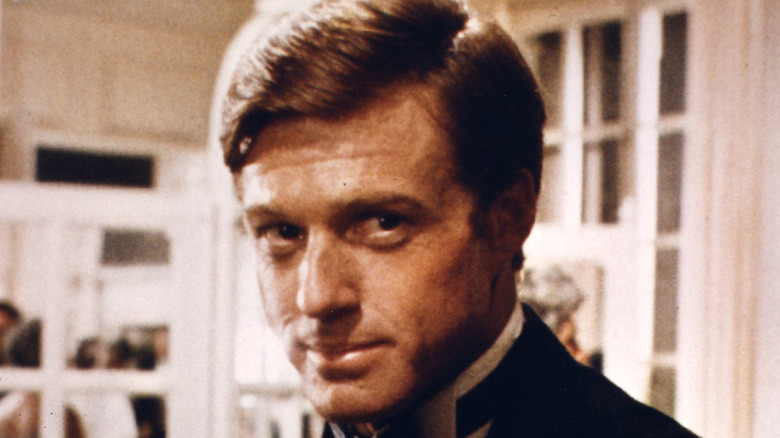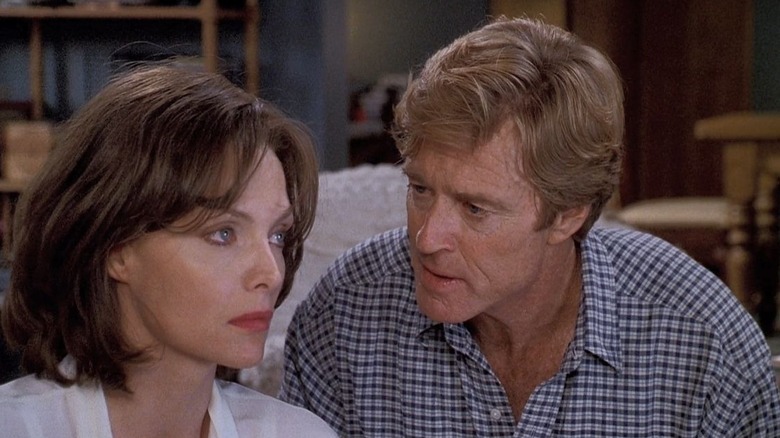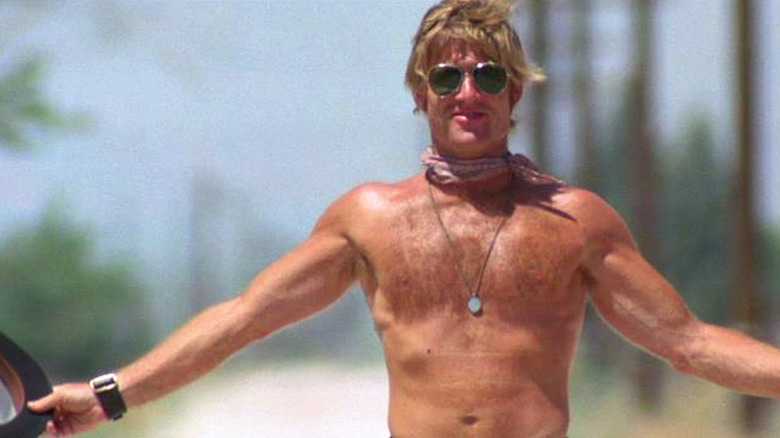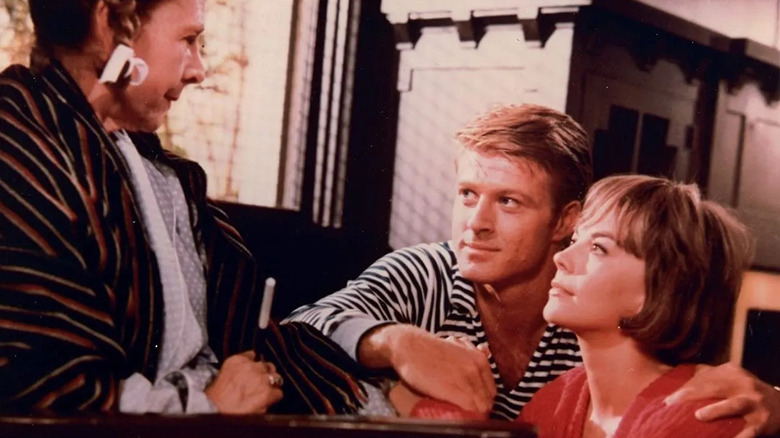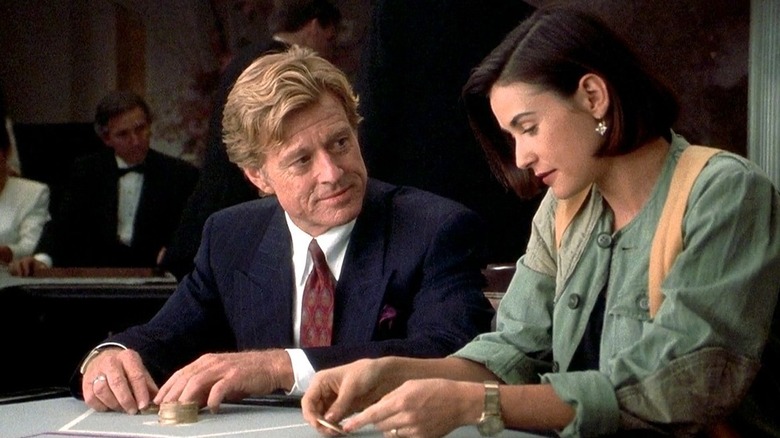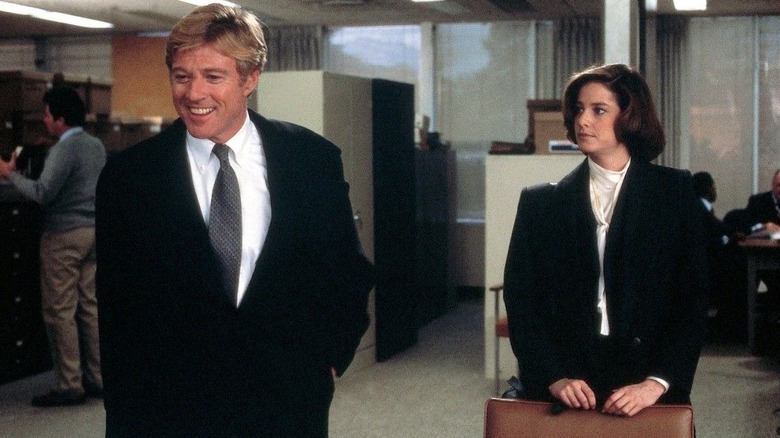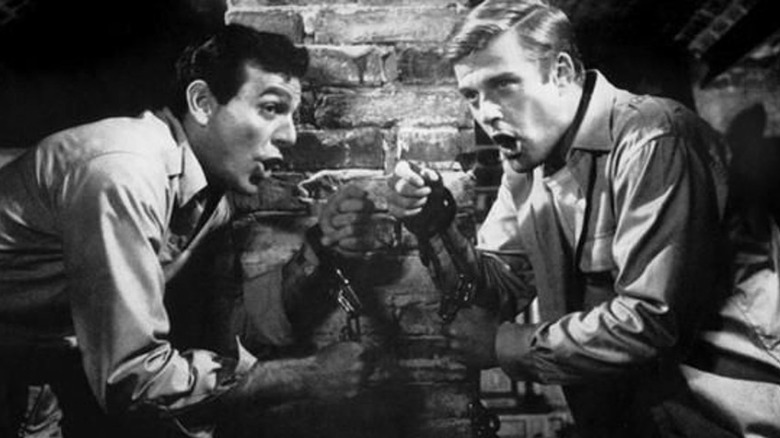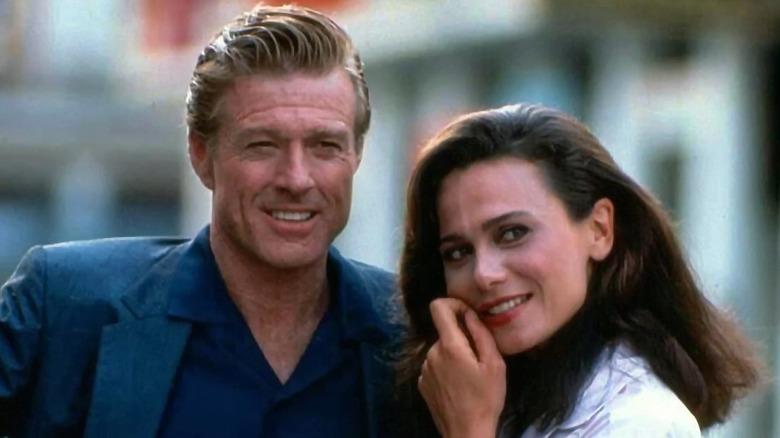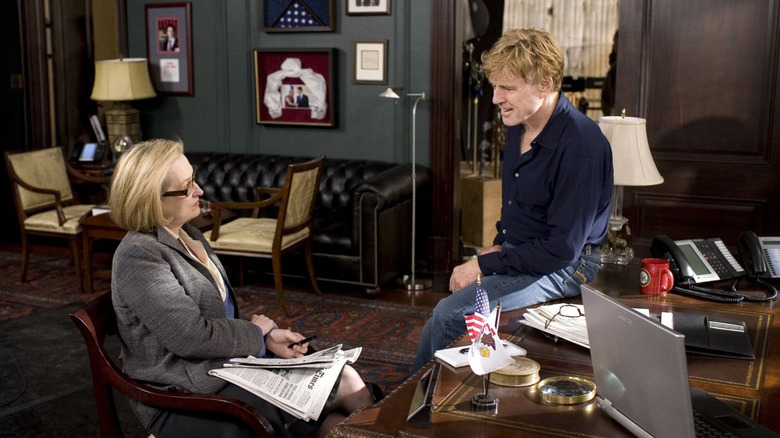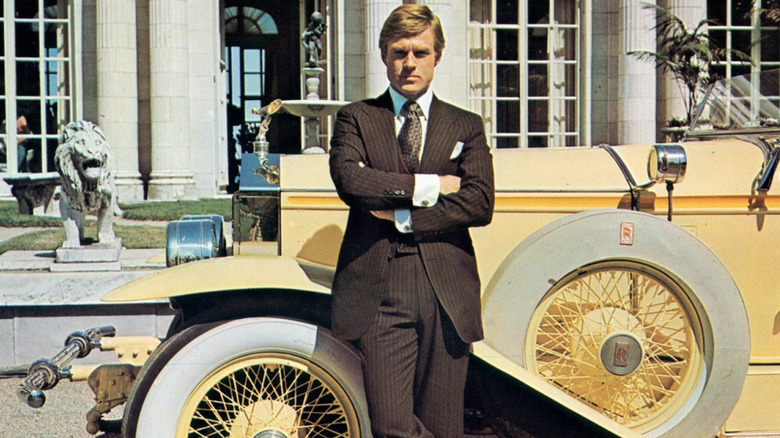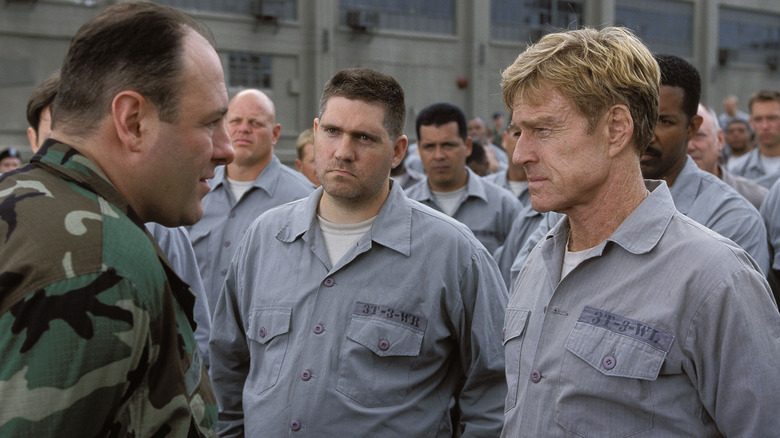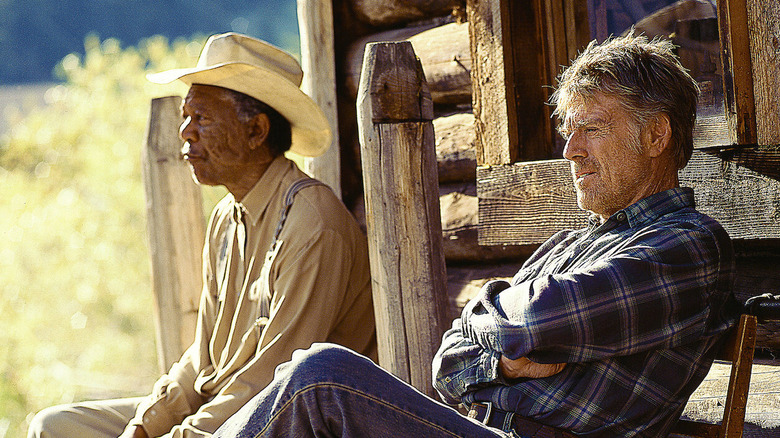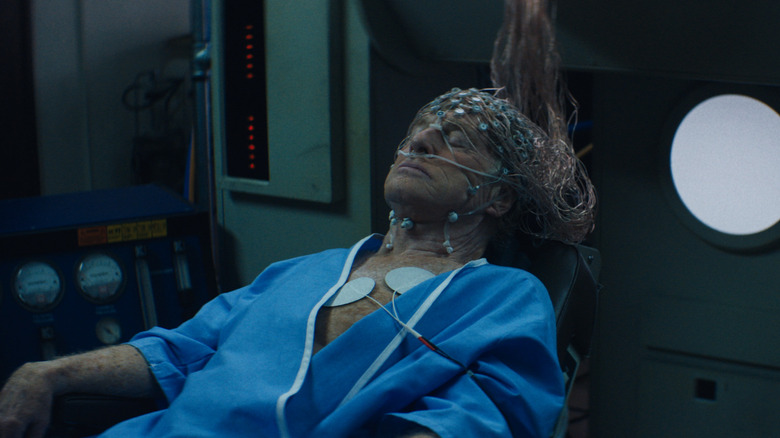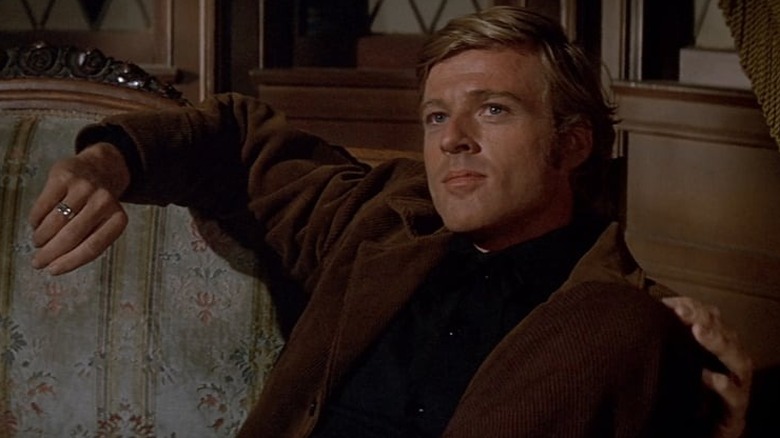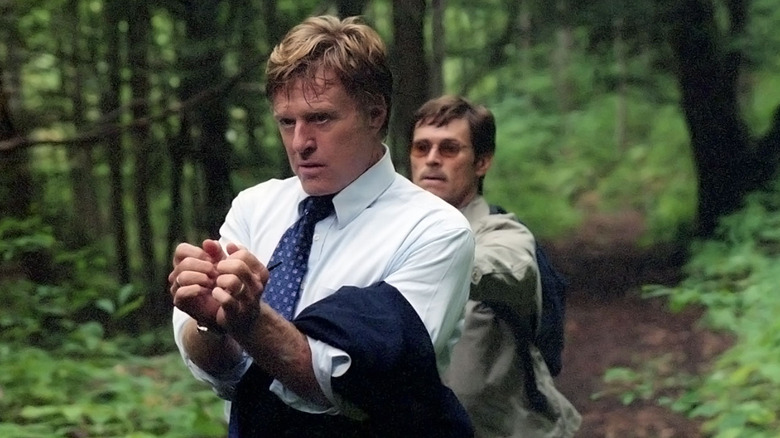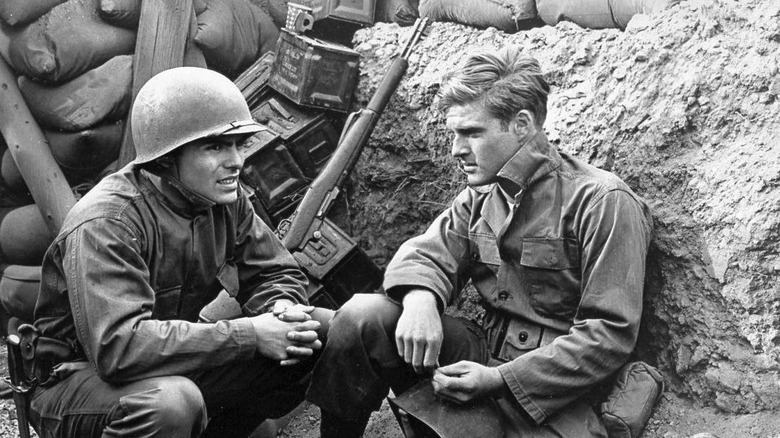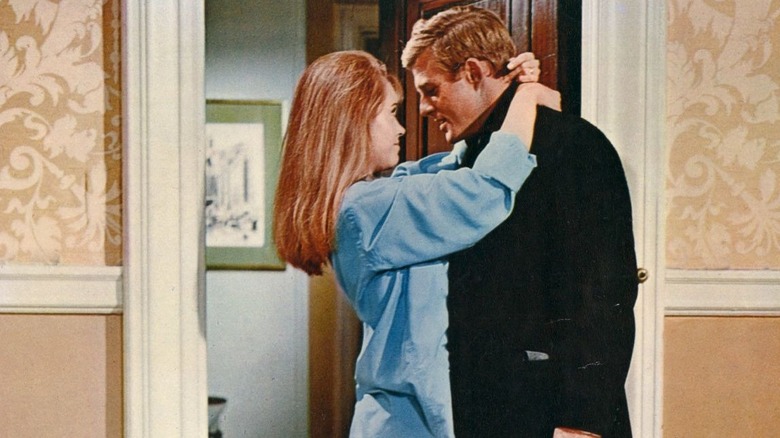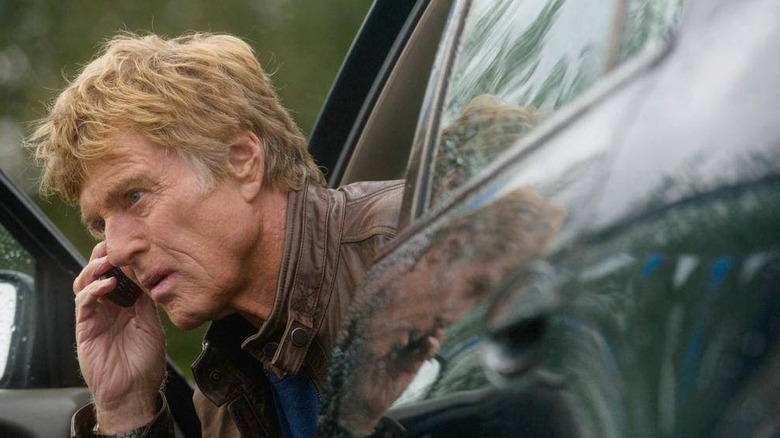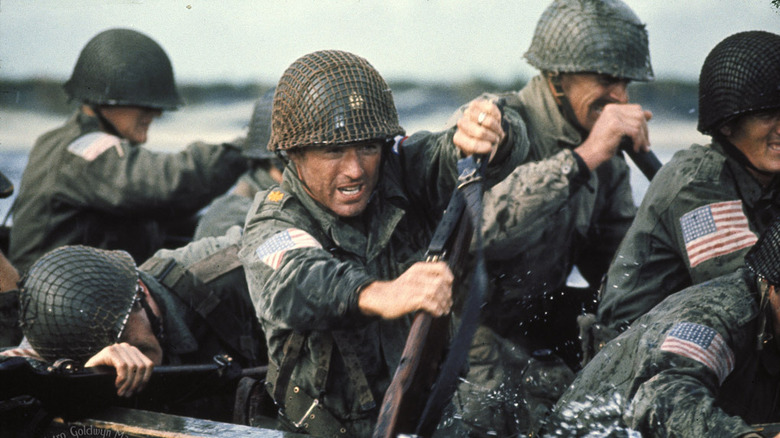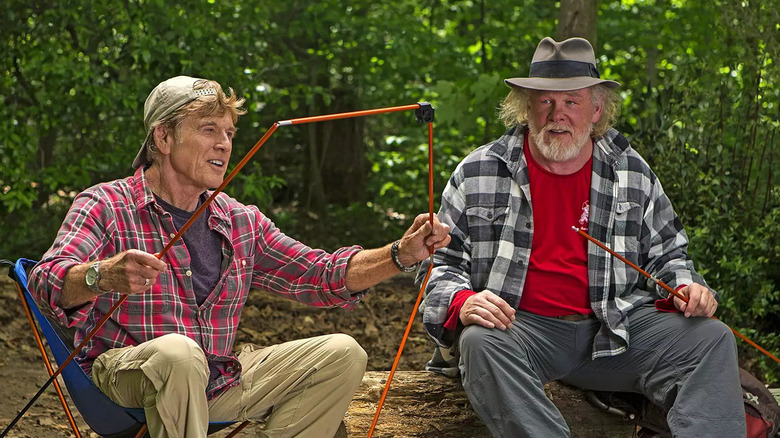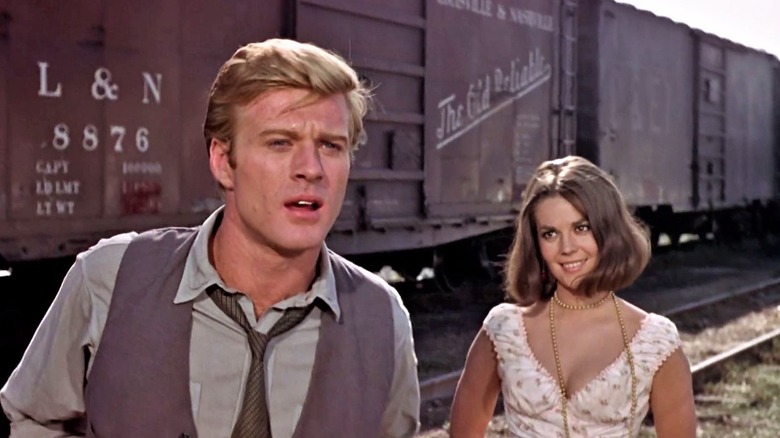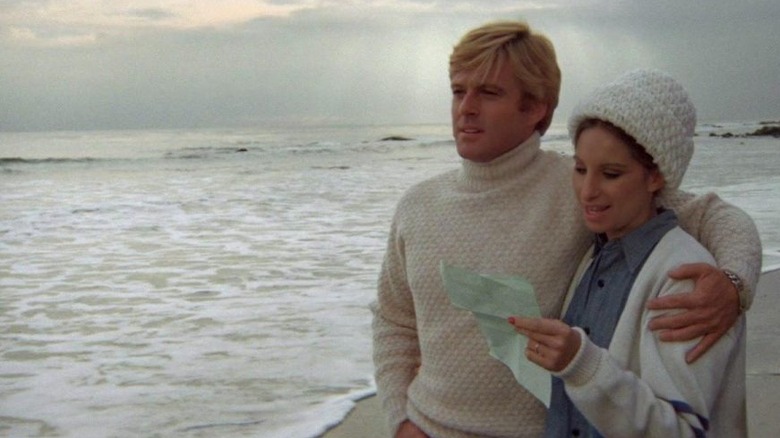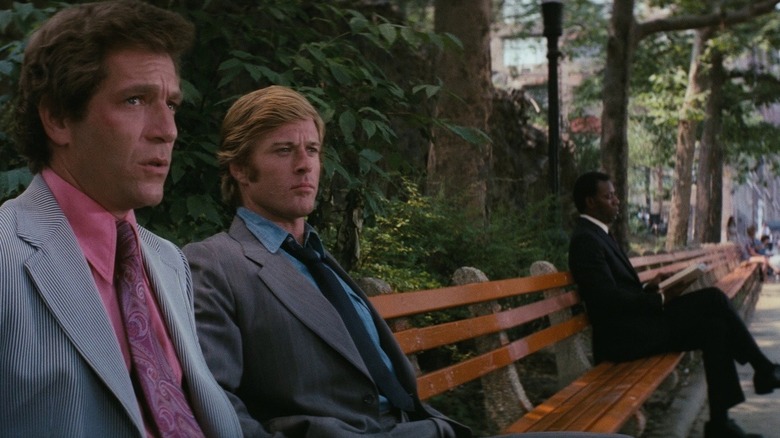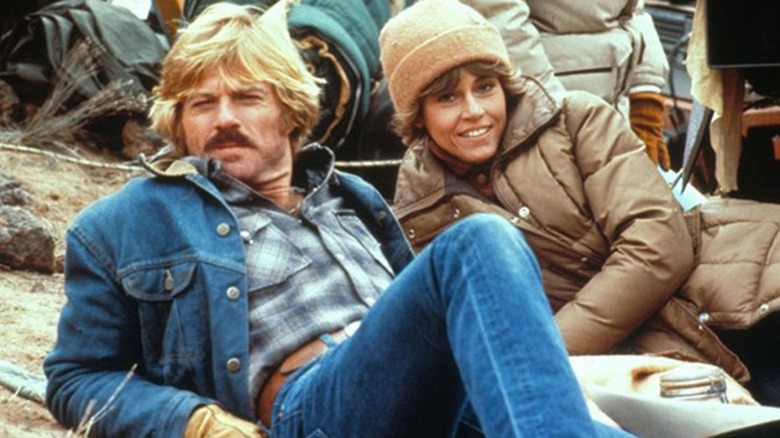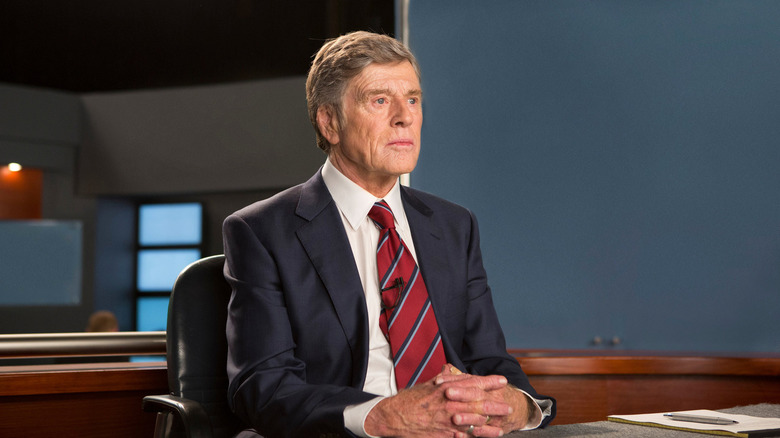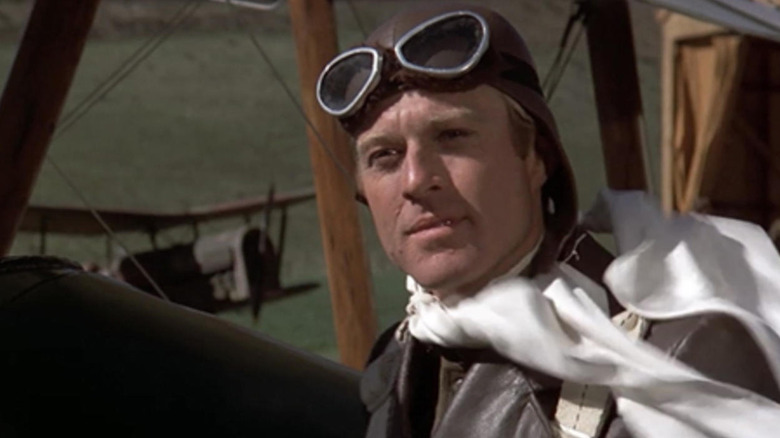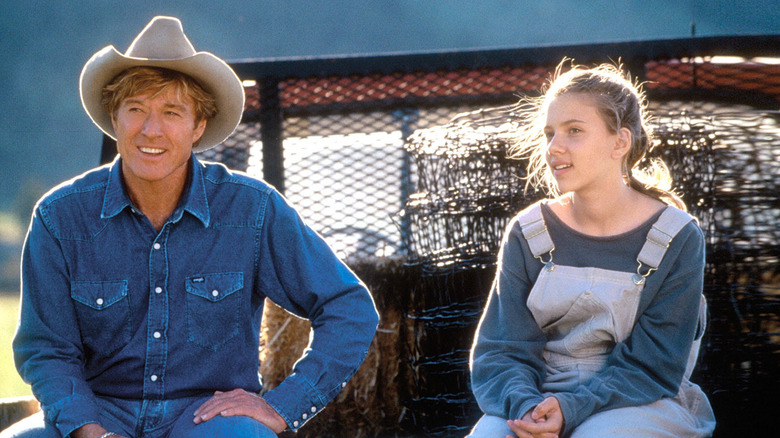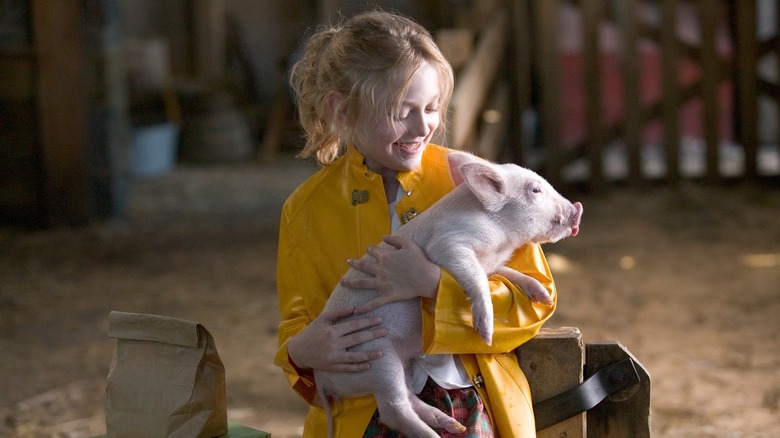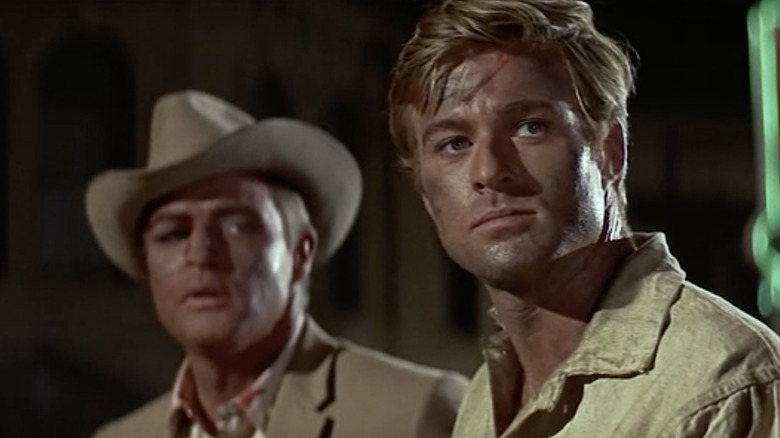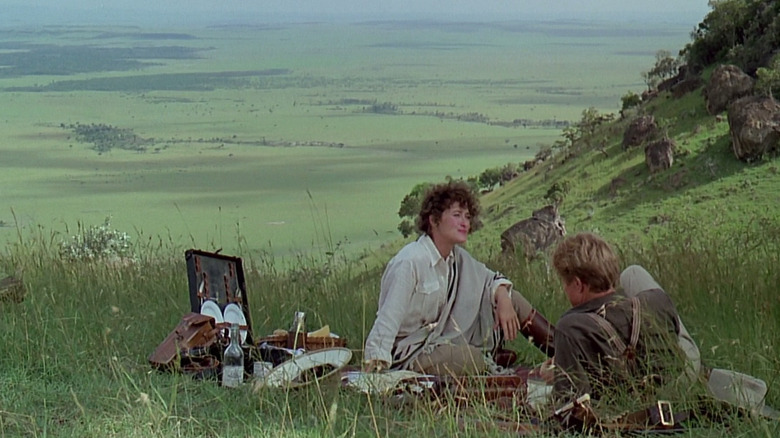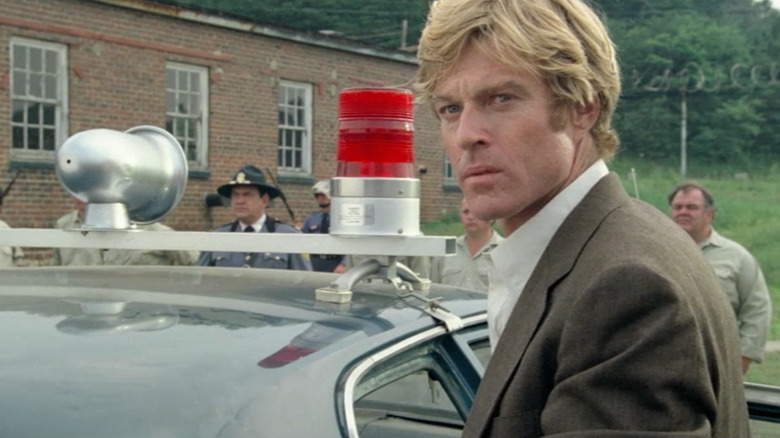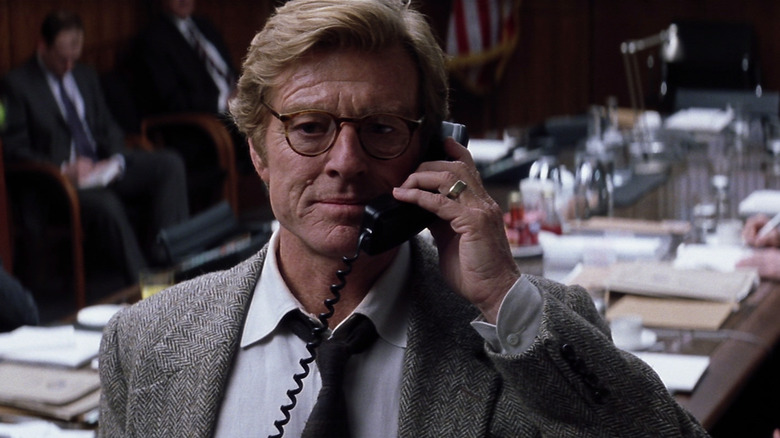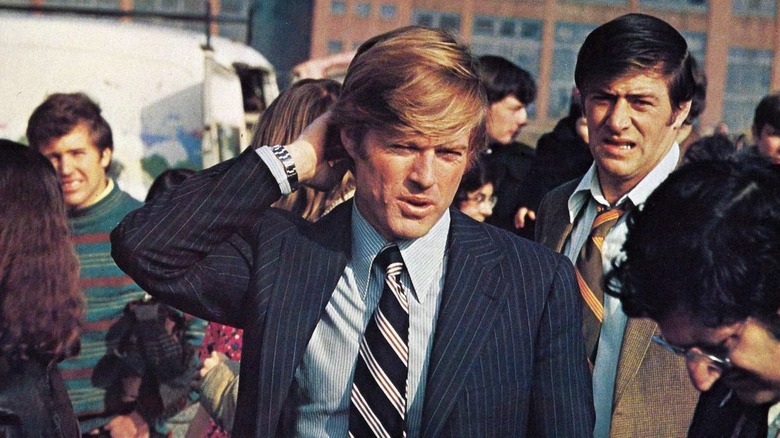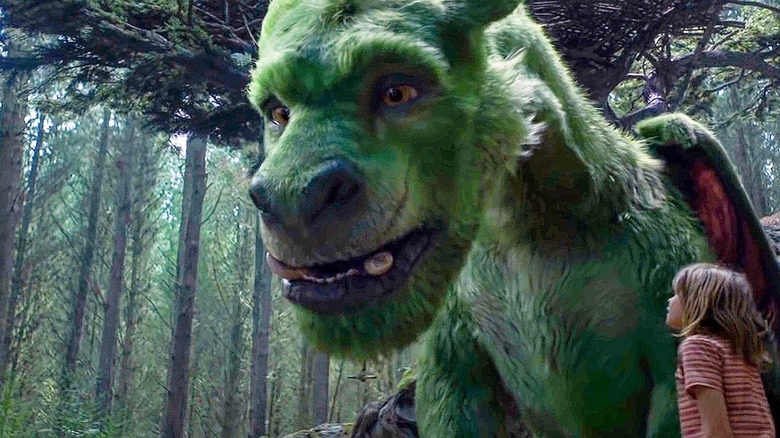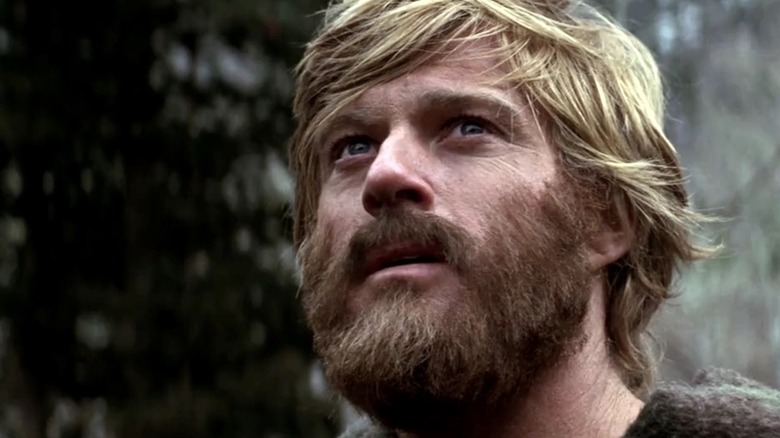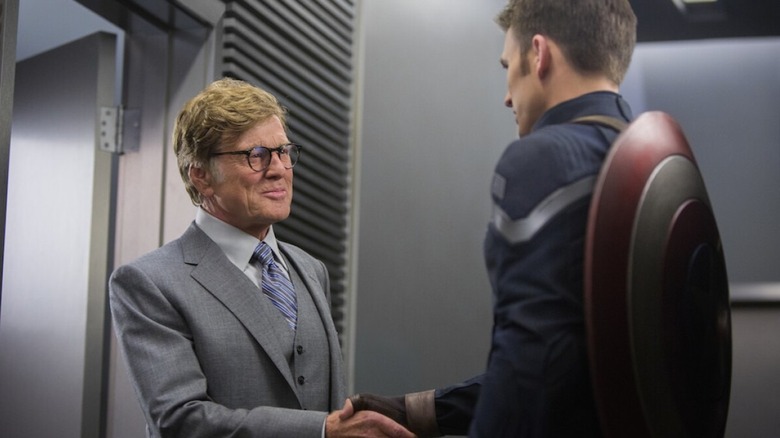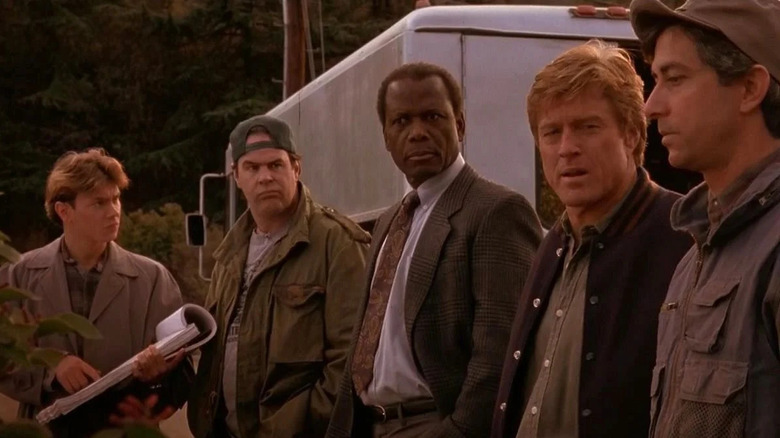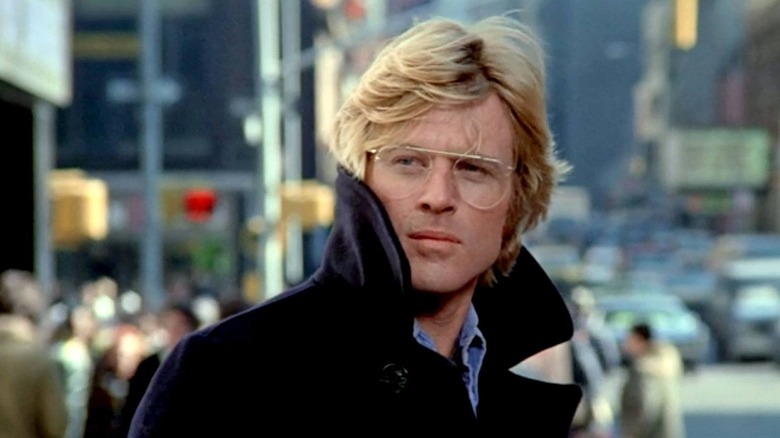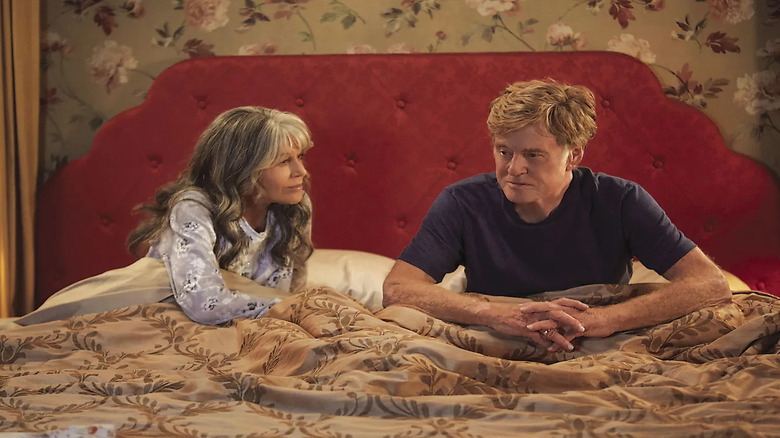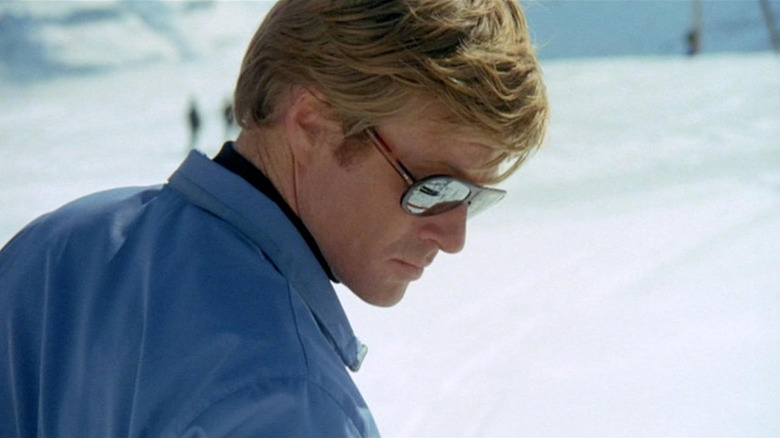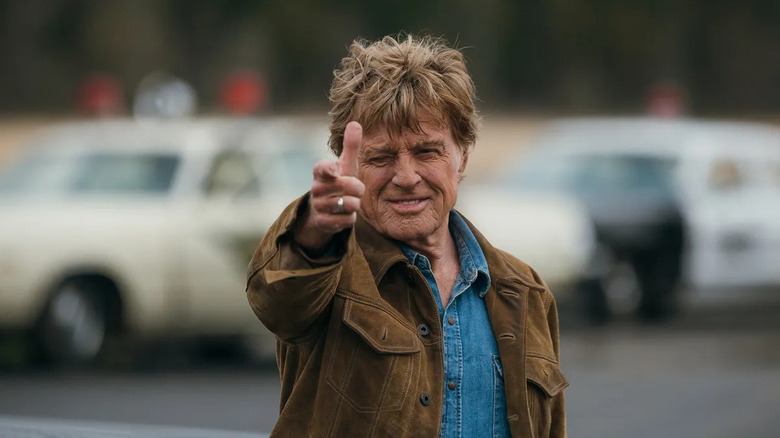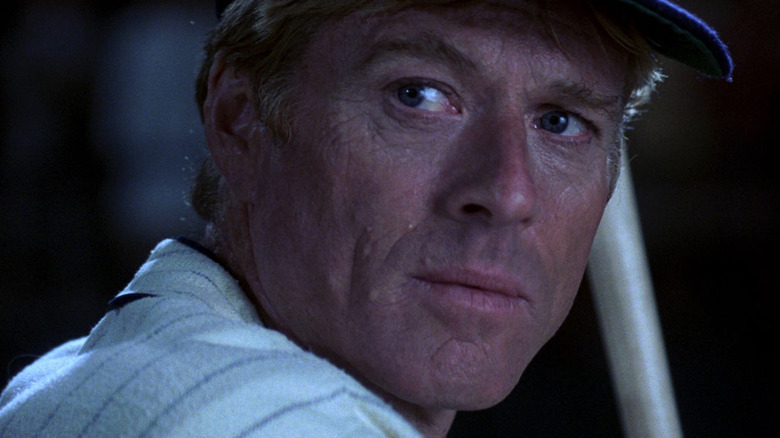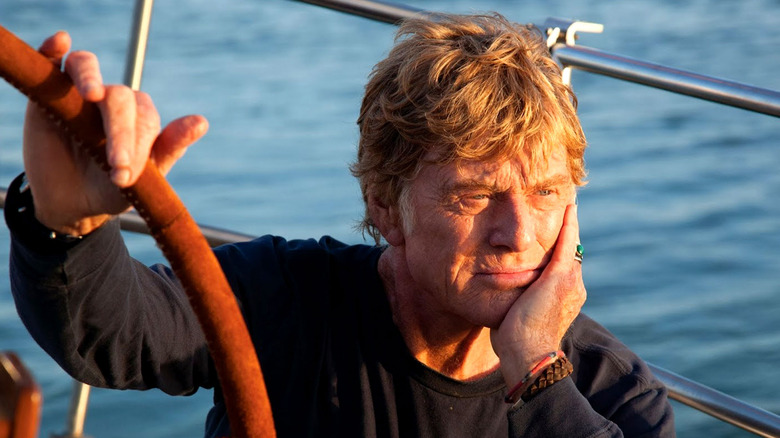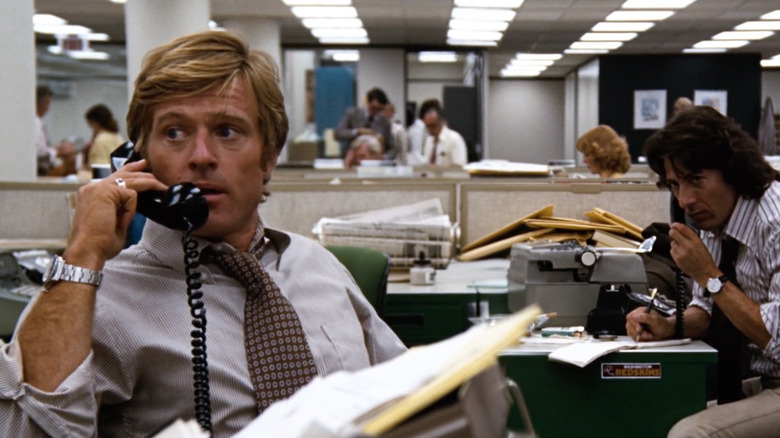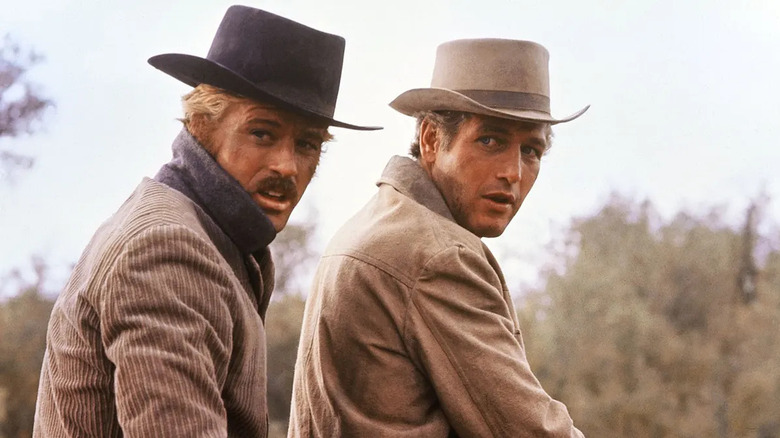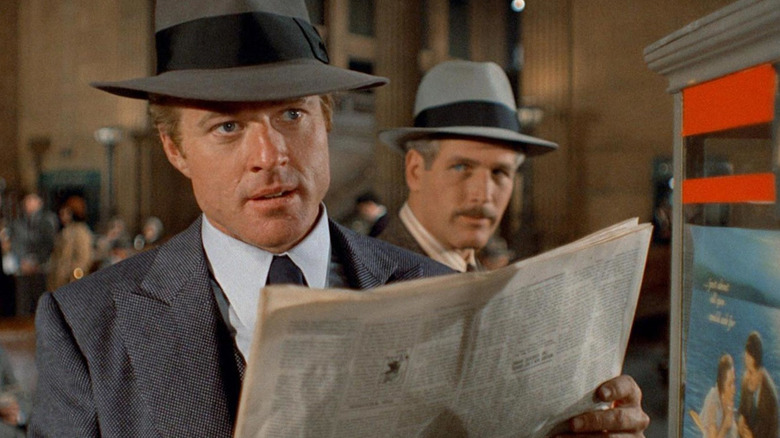Every Robert Redford Movie Ranked Worst To Best
For more than sixty years, Robert Redford has been a stalwart of Hollywood — both as an actor and director. His long and storied career encompasses all genres, from romantic dramas and Westerns to period pieces, war films, sports movies, and more. Known early on in his career as the epitome of the leading man heartthrob, Redford grew into a wide range of roles over the decades, becoming a popular star across all ages and leaving an enduring legacy.
Of course, as is true for any actor with an extensive catalog of films to their name, Redford has featured in about as many duds as he has critical and commercial successes. The road to Hollywood superstardom is paved with lackluster scripts, and no amount of talent can save you from occasional missteps once you're on the path. Fortunately, even Redford's worst films have the redeeming quality of him being at the center, delivering a high baseline of charisma to help viewers make it to the end credits.
Casual fans of Redford's work may only be familiar with his biggest successes. More devoted viewers may have seen a number of his less prominent films. But there are probably very few who have seen every movie with a major role for Redford. There's only so much time in the day for watching old movies, after all, and some just aren't worth a return visit. So, to make your selection process a bit easier, here is every Robert Redford movie ranked from worst to best.
45. Up Close and Personal (1996)
Redford has always been a handsome, charming leading man, but there comes a time in every male Hollywood star's career when they need to stop getting cast in romantic roles alongside much younger women. That's the dilemma at the center of 1996's "Up Close and Personal," a John Avnet film that features Redford and Michelle Pfeiffer as unlikely love interests.
The core story here is one that almost certainly wouldn't fly today, for obvious reasons: Pfeiffer plays a young, ambitious news reporter who develops a complicated mentor/mentee relationship with her station manager, played by Redford. She eventually leaves his station for bigger and better things, but he remains important to her, and they continue a romantic relationship for some time. At the end of the film, Redford's character is killed while covering political unrest in Central America — a job he takes after being inspired by his partner's own professionalism.
The problem here, as many critics noted at the time, is that Redford and Pfeiffer just don't work as romantic leads. Pfeiffer was in her mid-thirties at the time, while Redford was pushing sixty, and there's an incredibly uncomfortable energy to their boss/employee relationship that haunts the entirety of the film. Nothing about the script or the direction make up for that core problem, leaving a hollow film with very little appeal. Gene Siskel said it best in his Chicago Tribune review: "Is it worse as a love story or as a drama about the sorry state of television news? The answer: It's a tie."
44. Little Fauss and Big Halsy (1970)
An early starring role for Redford in 1970, "Little Fauss and Big Halsy" has him cast as Halsy Knox — a professional dirt bike racer who strikes up a friendship with fellow motorcyclist Little Fauss (Michael J. Pollard). Their friendly rivalry turns more aggressive when they both fall in love with the same woman (Lauren Hutton), ultimately leading to a final, climactic race between the two men. Though both characters have their good and bad qualities, Redford's Halsy is explicitly the antagonist of the film, which is an interesting contrast to most of his other roles from the era.
Unfortunately, that and a Golden Globe-nominated soundtrack (featuring Bob Dylan and Johnny Cash) are the only interesting things about "Little Fauss and Big Halsy." Variety called it "an uneven, sluggish story" upon its release, which accurately sums up the film's issues with pacing and direction. There is little in the realm of compelling character development, and not much of interest happens in the whole movie, aside from the occasional motorbike race. Even for Robert Redford loyalists, "Little Fauss and Big Halsy" may have to be a pass. It's just another of the so many "Easy Rider" wannabes of the era, and there's just nothing of real interest to grab onto here.
43. Inside Daisy Clover (1965)
"Inside Daisy Clover" is a movie made in 1960s Hollywood about 1930s Hollywood, and it isn't very good. The film stars screen legend Natalie Wood as the eponymous Daisy, an ordinary young woman with aspirations of fame on the big screen. After meeting unscrupulous studio executive Raymond Swan (Christopher Plummer), she quickly begins to rise through the ranks, eventually marrying a fellow actor named Wade Lewis, played by Redford. Things go awry, however, when the incorrigible greed and viciousness of the Hollywood system bringing Daisy back down to Earth, a little the worse for wear.
Despite the combined star power of Plummer, Redford and Wood, "Inside Daisy Clover" ultimately falls flat. The critics panned it, and though it earned a few ancillary Academy Award and Golden Globe nominations, there's little of merit in the film, especially in retrospect. Perhaps the most notable thing about "Inside Daisy Clover" today is that Redford's character is identified as being gay on screen, which was significant at the time — especially given that, unlike most queer Hollywood characters up until that point, he actually survives the end of the story. Redford also won the Golden Globe Award for Most Promising Newcomer (Male), foreshadowing the success that would soon come his way.
42. Indecent Proposal (1993)
Make no mistake — when this Adrian Lyne erotic thriller hit theaters, it became a phenomenon. It seemed like everyone had seen the film and was debating its main question: Would you?
"Indecent Proposal" is ... strange. It's one of Robert Redford's most famous and commercially successful films, and also objectively one of his worst. Based on the novel of the same name by Jack Engelhard, "Indecent Proposal" stars Demi Moore and Woody Harrelson as Diana and David Murphy — a young couple faced with money troubles. On a trip to Las Vegas, they encounter billionaire John Gage, played by Redford, who makes the titular indecent proposal: $1 million in exchange for one night with Diana. The couple ultimately decides to go through with the idea, but it only ends up tearing them apart.
It's a bold plot to be sure, but "Indecent Proposal" could have used that outline to tell a powerful, cutting story about the evils of absurd wealth and how the rich prey on ordinary people. Unfortunately, the film is not sophisticated enough to attempt anything near that kind of thematic depth. Critics lambasted the script, which left its three talented stars very little to work with despite a promising foundation. "Indecent Proposal" did well at the box office, grossing nearly $270 million worldwide, but it also won Worst Picture at the 1994 Golden Raspberry Awards and earned a staggering seven nominations, including one for Redford's own performance. If the star were to make a shortlist of the films he's proudest of making, this almost certainly would never make the cut.
41. Legal Eagles (1986)
If "Indecent Proposal" is strange, "Legal Eagles" is downright baffling. It's a film that attempts to be a white collar crime movie, a legal drama, and a romantic comedy, but it doesn't pull any of the three angles off particularly well. With a Metacritic average score of 56 and a Rotten Tomatoes rating of 44%, there isn't much of value to be found here. However, there's enough entertainment value in Redford, Debra Winger, and Daryl Hannah's lead performances and the outright convoluted pacing of the film to put it above the worst of the worst on this list.
Describing the plot of "Legal Eagles" in the space allotted here would be a fool's errand, as the whole film feels rushed and confused, but here's the basic gist: a young artist (Hannah) becomes implicated in a variety of crimes including art theft and murder, and with the help of her lawyer (Winger), she seeks out soon-to-be Manhattan District Attorney Tom Logan (Redford) to help her. There are twists, turns, murders and attempted murders, and some all-too-quickly forced romance plotlines that fall completely flat. "Legal Eagles" is far from a good movie, but the ways in which it is bad are a lot more fun than the films it beats out here.
40. Situation Hopeless — But Not Serious (1965)
One of Redford's first films, "Situation Hopeless — But Not Serious" is an odd farce set at the end of World War II. Two American pilots (played by Redford and Mike Connors) are forced to parachute out over Germany and wind up being imprisoned by an eccentric German man named Wilhelm Frick, played by Alec Guinness. What follows is a series of increasingly implausible events as Frick — desperate for company — attempts to keep his two prisoners happy and feeds them false updates about the war, which soon comes to an end. They make various escape attempts but never take their ordeal too seriously, developing a sort of frenemy relationship with their woefully incapable captor.
"Situation Hopeless — But Not Serious" may be the most bizarre movie Robert Redford has ever made. There's a certain level of absurd appeal in the farcical comedy, but a lot of it sadly falls flat. The film earns points over some of the worst entries ranked here simply because it is so unique and at times achieves genuine zany fun, but it's still difficult to recommend to most audiences. Perhaps the most interesting thing about the movie from a Redford standpoint is that the story is based on a novel by Robert Shaw — a writer and actor who Redford would play opposite years later in "The Sting."
39. Havana (1990)
Robert Redford made a lot of movies with acclaimed director Sydney Pollack, many of which are quite good. "Havana," released in theaters in 1990, is not. Set in 1958 revolutionary Cuba, the film follows Redford's Jack Weil — a former soldier in the U.S. Navy who becomes romantically involved in an agent of the Revolution, played by Lena Olin. Alan Arkin and Raul Julia also star. While "Havana" earned praise for its aesthetic qualities — the set and costume design, cinematography, and score in particular — it was still largely panned. Redford turns in a solid performance, but the love story is messy in its execution and the rich narrative potential of the setting is largely squandered as a result.
Even the past successes of Redford and Pollack's collaborations couldn't save "Havana" in the public eye, and the film wound up being a box office bomb as well as a critical one. With a reported budget of $40 million — pretty pricey for the era and genre — the film failed to even make its costs back (per The Numbers). There are some gorgeous shots in "Havana," the audiovisual experience is laudable, and Redford is plenty charismatic in the leading role, but there's just not enough substance here to make for a winning film.
38. Lions for Lambs (2007)
Robert Redford, Meryl Streep, Tom Cruise, Michael Peña, and Andrew Garfield — looks like a winning cast on paper, but unfortunately, it wasn't enough to make 2007's "Lions for Lambs" much good. Directed by Redford himself, the film attempts to offer commentary on the U.S. war in Afghanistan, relayed through a vignette structure with several related but largely unconnected storylines. That attempt at a bold format ultimately fails, resulting in a film that feels messy, clunky and without much sense of direction. "Lions for Lambs" holds a dismal 27% on Rotten Tomatoes, with Roger Ebert calling it a "talkathon" that gives viewers "the delusion that it's going somewhere."
The skeleton of an interesting, thought-provoking film lives somewhere beneath the surface of "Lions for Lambs," and the performances from Streep, Redford, and Garfield do attempt to unearth it, but those efforts ultimately prove unsuccessful. Today, "Lions for Lambs" reads like a dense, fallible monument to the idea that simply trying to say something about American militarism is enough to carry a two-hour film. Spoiler alert: it's not.
37. The Great Gatsby (1974)
More than anything, 1974's "The Great Gatsby" is a testament to the fact that film adaptations of novels usually require significant changes to the source material. While many adaptations fail by diverging too much from the original story, Robert Redford and Mia Farrow's "The Great Gatsby" falls short largely because it stays too loyal to F. Scott Fitzgerald's book. The result is a lumbering, dull film, with talented stars and a lavish production design that ultimately prove insufficient to save it.
As many critics noted at the time, Redford's "Gatsby" upholds the letter of Fitzgerald's novel but mostly misses its spirit. The lush tale of full-speed self-destruction is supplanted by a slow-burn romance that feels like it would be more appropriate in a Regency era period piece than a Jazz Age party film. Francis Ford Coppola's script largely falls flat and gives Redford and Farrow very little that's exciting to work with. Jack Clayton's direction plays to the screenplay's slow pace in its own detrimental ways, compounding the film's core problem: it is boring. There are redeeming aspects to "The Great Gatsby," of course, such as the musical score and period costume design — both of which won Academy Awards. Redford and Farrow show signs of greatness here as well, but they ultimately end up smothered by the film's incessant sentimentality.
36. The Last Castle (2001)
Putting Redford alongside James Gandolfini, Mark Ruffalo, Clifton Collins, Jr., and Delroy Lindo, "The Last Castle" is a film about an uprising at a U.S. military prison. Redford plays a disgraced, court-martialed former general who quickly earns the ire of the prison's brutal warden, played by Gandolfini — and the respect of his fellow inmates. He leads the other soldier inmates in an elongated revolt, re-instilling a sense of honor and military organization in them and standing up to the tyrannical rule to which they've been subjected.
It's a promising setup, and at times, it shines. Gandolfini was in the middle of "The Sopranos," making him an easy pick for a leading Hollywood role, and Redford is charming and easy to root for, as he often is. Unfortunately, those high points are hampered by a lackluster script, bad pacing, and an overly melodramatic tone. The New York Times called the film "exuberant, strapping, and obvious" in its review, and the overall critical response fell on the negative side of mixed. It's easy to see diehard fans of Redford's work still enjoying "The Last Castle" despite its many flaws, but it's a far cry from his best films.
35. An Unfinished Life (2005)
Okay, we're officially done with the "mostly bad" Robert Redford movies — and with more than 30 to go, that's the true litmus test of a legendary career. "An Unfinished Life" has its share of flaws, and it's far from a great film, but there's enough good here to make it a much easier recommendation than the previous movies on this list, especially for Redford fans.
Directed by Lasse Hallström, "An Unfinished Life" is a simple human drama about family and healing. It stars Redford and Morgan Freeman as Einar and Mitch, two lifelong friends (life partners?) who own and operate a ranch outside a small town. Their quiet life is upended when Einar's daughter-in-law (Jennifer Lopez) and granddaughter (Becca Gardner) move in with them, leading to some confrontations about Einar's late son. Josh Lucas, Camryn Manheim, Damian Lewis, and Lynda Boyd also co-star.
The problems in "An Unfinished Life" are largely shortcomings of the genre — aggressive sentimentality that can get in the way of actual emotional nuance, a slow pace that can make the story drag at times, and a dearth of original ideas. The metaphors are blatantly obvious, and the messaging is heavy-handed. However, the story is crafted well enough to keep fans of the genre invested, and the x-factor of the film's exceptional cast elevates it to occasional moments of greatness. Redford and Freeman's onscreen friendship is the main draw here, and any scene where Mitch and Einar interact is a high point. It doesn't ask much of its viewers, and it doesn't offer anything new, yet there is an undeniable appeal to "An Unfinished Life."
34. The Discovery (2017)
Netflix's "The Discovery" envisions a fascinating, grim future where scientist Thomas Harbor (Redford) proves irrefutably the existence of an afterlife, resulting in mass suicides across the world. The film follows his son, Will (Jason Segel) and a mysterious woman he meets names Isla (Rooney Mara) as they investigate the cult-like compound where Thomas conducts experiments with the help of his acolytes (Jesse Plemons and Riley Keough). The film poses a lot of interesting questions, delivers a few great psychological thriller twist moments, and boasts solid performances from its stars, but is ultimately held back from greatness by an inability to tie it all together.
Some critics praised "The Discovery" for its ambitious nature, including The Chicago Sun-Times' Richard Roeper, who called the film "a fascinating albeit sometimes convoluted journey" in his review. However, "The Discovery" was ultimately met with more criticism than praise, earning it a complicated legacy and a middle-of-the-road Metacritic average of 54. It's a film more interested in asking questions and debating philosophical viewpoints than it is capable of delivering a complete and conclusive story, but that may hold appeal for some fans of the genre. If you're coming to the movie strictly for Redford, there's also a lot to love. Thomas Harbor is a fascinating character, and Redford plays him with complexity and nuance.
33. Tell Them Willie Boy Is Here (1969)
Based on the true story of Willie Boy, an Indigenous American man killed by California police in 1909, "Tell Them Willie Boy Is Here" earned positive reviews upon its 1969 release, with Redford and his "Butch Cassidy" co-star Katharine Ross winning awards for their performances from the British Academy of Film and Television Arts. It's a well-crafted, stylish Western in the classical tradition, which attempts to address aspects of the violence committed against Native Americans by white aggressors and their land theft.
Unfortunately, "Tell Them Willie Boy Is Here" doesn't play nearly as well through a modern lens. While certainly progressive in its day, the film is plagued by tokenizing and fetishizing portrayals of the Indigenous experience that paint the erasure of Native cultures as an inevitable tragedy and the role of white Americans in that erasure as morally complex, rather than objectively evil. This problematic approach is perhaps best summed up by the fact that Willie Boy himself is played by Robert Blake, an Italian American actor frequently cast as characters of color throughout his career. There's an inherent perverseness to a film that tries to memorialize the killing of Native Americans but won't even cast an Indigenous actor to play the Chemehuevi-Paiute character at the heart of its story. As a result, "Tell Them Willie Boy Is Here" is merely a well-made film that's difficult to recommend to contemporary viewers.
32. The Clearing (2004)
Part psychological thriller and part relationship drama, Pieter Jan Brugge's "The Clearing" is an intriguing film with a great core cast that ultimately falls short of its potential. While the film earned high scores from prestigious publications like the San Francisco Chronicle, Los Angeles Times, Chicago Sun-Times, and Rolling Stone (via Metacritic), it also received a fair share of negative reviews that criticized the film's lack of depth and entertainment value.
Starring an all-star trio of Robert Redford, Helen Mirren, and Willem Dafoe, "The Clearing" tells the story of a successful businessman named Wayne Hayes (Redford) who is kidnapped by a former employee (Dafoe). The film jumps evenly between Hayes' ordeal and the FBI investigation into his disappearance, with the latter plotline focusing primarily on Hayes' wife (Mirren). As you might expect, the three lead stars are exceptional, and there are a number of interesting relationship dynamics that come about between them as the story progresses.
The downside of "The Clearing" mostly comes from its self-indulgent tone and a slow pace that robs it of suspense. The film clearly intends audiences to watch on the edge of their seats, but the direction fails to capture anything so compelling. Fortunately, the stellar performances from Redford, Mirren, and Dafoe are enough to carry "The Clearing" from start to finish.
31. War Hunt (1962)
For his first feature film, Robert Redford could have done a lot worse than 1962's "War Hunt," which put him alongside John Saxon, Charles Aidman, and future collaborator Sydney Pollack (making it the first project the two worked on together).
Set in the final days of the Korean War, the film follows Roy Loomis (Redford), an American soldier stationed near the front lines. He quickly becomes interested in fellow soldier Raymond Endore (Saxin), who vanishes at night to sneak behind enemy lines and kill opposing soldiers. Endore's methods and behavior show signs of immense cruelty and mental illness, but the company's commanding officers are happy to let him go about his business as he proves useful in their cause. "War Hunt" looks at the effects of combat on mental stability and how actions that would be considered reprehensible in any other context are allowed and even encouraged in the context of war.
"War Hunt" was named one of the ten best films of 1962 by the National Board of review and was lauded upon its premiere at the Locarno International Film Festival, winning the award for best feature film. It's a dated and very low-budget film, but it still has a good amount of style and a powerful message executed quite well.
30. Barefoot in the Park (1967)
Neil Simon's "Barefoot in the Park" is a film that shows its considerable age. It may hold more appeal today as a museum piece — an example of the kind of light romantic comedy that thrived in mid-20th century Hollywood. But despite the dated feel, it's still a fun (if overly silly) movie led by the fabulous young pairing of Robert Redford and Jane Fonda.
The basic plot here of "Barefoot in the Park" is that two young lovers marry and quickly find themselves at odds given their wildly disparate personalities, only to rediscover their true affections for each other after a series of comical events. It's the exact formula that made Simon one of the biggest names in stage and screenwriting at the time, and there's still charm and fun in it decades later. "Barefoot in the Park" reviewed well on the merits of the two stars it helped launch, and it remains a worthwhile time capsule for any modern fans of Redford and Fonda. There isn't much depth here in terms of narrative complexity, but sometimes being a breezy good time is more than enough.
29. The Company You Keep (2012)
Directed by Redford, who also stars, 2013's "The Company You Keep" is a film about American youth radicalism in the 1960s, ethics in modern journalism, and getting old. Redford plays a former member of the anti-Vietnam War group Weather Underground, who has lived for decades under a fake name to avoid arrest over crimes committed in his militant youth. He's eventually outed by a young reporter (Shia LaBeouf) after a former comrade (Susan Sarandon) is finally caught. Redford's character must go on the run in an attempt to clear his name, reconnecting with old friends and lovers and dodging the prying eyes of both law enforcement and the press.
"The Company You Keep" was praised upon its premiere at the Venice Film Festival, but its overall critical reception ended up being a lot more mixed. The film attempts to balance messy commentary on the nature of radicalism and the fallout of anti-war activism in the 1960s with the cinematic elegance of a fugitive thriller, but your own mileage may vary on how effective that blend ends up being. Surely, "The Company You Keep" is more commendable for its ambition than for its ultimate execution, but Redford does a strong job behind the camera, and the film boasts an absurd cast featuring the likes of Julie Christie, Anna Kendrick, Terrence Howard, Nick Nolte, Chris Cooper, Sam Elliot, Richard Jenkins, Stanley Tucci, and Stephen Root.
28. A Bridge Too Far (1977)
"A Bridge Too Far" isn't really a Robert Redford movie. It's an epic ensemble war film in which Redford is but one member of a massive star-studded cast that includes James Caan, Michael Caine, Sean Connery, Anthony Hopkins, Elliott Gould, Gene Hackman, Laurence Olivier, and the list goes on and on. Still, Redford's character, Major Julian Cook, plays a prominent role in the film, earning a spot on this list.
Unfortunately, that spot isn't quite as high as the cast of "A Bridge Too Far" might indicate. Despite its star power and (for the time) massive budget, the film received a lukewarm critical response, with Roger Ebert calling it "the longest B-grade war movie ever made" in a two-star review. Others criticized the film's length and poor pacing. The reception wasn't all bad, however. Some critics praised "A Bridge Too Far" for its special effects and the strength of its ensemble, and it was nominated for eight BAFTA awards in 1978, including Best Film. The cinematography, musical score, and sound design all won in their own categories.
"A Bridge Too Far" may be a bit of a slog at times, and it may be a bit too self-indulgent for its own good. However, it's still a strikingly produced, frequently entertaining example of the classic Hollywood World War II movie. For fans of that genre — you know who you are — "A Bridge Too Far" is still worth the watch.
27. A Walk in the Woods (2015)
Bill Bryson's autobiographical hiking book "A Walk in the Woods" is a touching, poignant, and frequently hilarious account of two friends fighting back against their advancing age by attempting to walk the Appalachian Trail. Ken Kwapis' film adaptation of "A Walk in the Woods" has a lot of the same heart as the book and features some absolutely gorgeous vistas, but it ultimately fails to achieve the same level of greatness as its inspiration. Still, there's a lot of merit in the film's natural scenery and in the wholesome onscreen play between Robert Redford and Nick Nolte.
In its reviews, "A Walk in the Woods" received both praise and criticism for the same main reasons: sentimentality and simple, unambitious storytelling. Whether those traits are reasons to watch or stay away will largely depend on the individual viewer. It is true that much of Bryson's signature wit is lost in the transition to the big screen, and "A Walk in the Woods" certainly could have accomplished more in its exploration of aging, friendship, and our relationship with nature. But what the movie ends up being — a fun, endearing, eminently watchable journey of two seasoned actors playing off each other — still holds plenty of appeal.
26. This Property is Condemned (1966)
Though they co-starred in "War Hunt," Sydney Pollack's first collaboration with Robert Redford as a director came in 1966 with this film adaptation of Tennessee Williams' short play. "Property" also marked Redford's second collaboration with Natalie Wood, following "Inside Daisy Clover." Charles Bronson, Mary Badham, and Kate Reid also co-star.
The story, told via flashback, follows the love affair between railroad company man Owen Legate (Redford) and small town girl Alva Starr (Wood). Owen travels to Alva's hometown to lay off a number of railroad workers at the height of the American Great Depression, and things devolve into a typical Williams tangle of jealousy, longing, and vice. It's a simple but effectively melancholy drama anchored by an excellent (and Golden Globe-nominated) performance by Wood, and it received an overall positive critical reception upon release (via Rotten Tomatoes).
Unfortunately, as with many similar films of the day, "This Property is Condemned" feels pretty dated by today's standard, and is therefore best viewed through a lens of retro nostalgia. Still, it's fun to see Pollack's first time directing Redford, the cinematography from the famed James Wong Howe remains stylish, and Williams' seedy world of messed up people (adapted for the screen by a pre-"Godfather" Francis Ford Coppola) still holds a fair amount of dramatic appeal.
25. The Way We Were (1973)
Another Redford classic romance film, 1973's "The Way We Were" put him opposite (and billed under) Barbara Streisand. The story follows Streisand's Katie Morosky, a leftwing political activist who, while in college, meets Hubbell Gardiner (Redford), a talented writer with no strong political convictions. Over the years, Katie and Hubbell enter and exit each other's orbits repeatedly, briefly getting married and having a daughter before splitting up for the final time. Katie stands as the film's moral compass, always fighting for a just cause and urging those around her to use their talents for good, while Hubbell represents the radical moderate, who would rather get rich and famous writing fluffy sitcom episodes than apply himself to writings of substance.
There are more complicated themes woven into the love story, but "The Way We Were" doesn't really examine them in much complexity. The appeal here, as critics have noted, is in the onscreen dynamic between Redford and Streisand, the latter of whom steals the spotlight commandingly. Their combined star power was enough to earn the film six Academy Award nominations in 1974, including one for Streisand's performance and two wins for Best Song (sung by Streisand) and Best Original Dramatic Score. The titular song earned another win at the Golden Globes, where Streisand's exceptional performance was once again nominated.
24. The Hot Rock (1972)
If you're a fan of Robert Redford, or just a fan of late 1960s/early 1970s heist movies like "The Italian Job," then you should probably check out 1972's "The Hot Rock." Starring a fantastic ensemble cast led by Redford and featuring George Segal, Ron Leibman, Paul Sand, Moses Gunn, William Redfield, Topo Swope, and Zero Mostel, "The Hot Rock" is a classic caper flick that delivers a nice blend of comedy and excitement.
Redford plays John Dortmunder, a thief who gets hired to steal a diamond from the Brooklyn Museum shortly after getting out of prison. With a crew assembled, the heist commences, only for things to go wrong again, and again, and again. It's a comical take on the genre that's carried by the chemistry of its core cast, and it's just a lot of fun. The film's reviews praised the performances and commended the script for its quick pace and entertainment value, though some critics knocked "The Hot Rock" for its lack of new ideas. The ending is also a bit questionable given the setup, but we won't spoil it here.
Today, "The Hot Rock" is still a fun watch that embodies a golden era of Hollywood heist movies. It's quick, light, and easy to watch, and that's really all a film like this needs to be.
23. The Electric Horseman (1979)
"The Electric Horseman" is a perfect example of the kind of film and the kind of performance that made Robert Redford a household name — the tale of a rough-around-the-edges sort-of cowboy who embarks on a journey of self discovery and romance. As such a patent example of the classic Redford film, it's only appropriate that "The Electric Horseman" also features two of his most frequent collaborators in co-star Jane Fonda and director Sydney Pollack.
Here's the pitch: Redford plays a former rodeo champion who now pays the bills as a spokesman for a popular breakfast cereal brand. Frustrated with the hollowness of his work, he finds a new lease on life during a Las Vegas promotion with a former champion race horse named Rising Star worth millions of dollars. Saddened by the horse's injured and tranquilized state (and perhaps seeing a bit of himself in the exploited, past-its-prime stallion) he steals Rising Star, hoping to take him some place far away where he can live out the rest of days with other wild horses. The police follow in pursuit, as does an ambitious reporter (Fonda) who ultimately strikes up a romance with the thief.
What you see is what you get with "The Electric Horseman." It's a simple film with simple themes, and that's not to its detriment. Redford and Fonda are great, and Pollack brings the whole story together in a satisfying and entertaining way. Roger Ebert put it best in his review: "If you have the right Boy and the right Girl and the right story, about all you have to do is stay out of the way of the Horse."
22. Truth (2015)
Picture this: A Robert Redford film based on the true story of reporters dealing with a Republican presidential scandal. No, not that one, the other one — it's 2013's "Truth."
While it may not be the masterpiece that is "All the President's Men," "Truth" is still a compelling film about the ethics of journalism and the media's role in modern politics. The true story in question is that of CBS News "60 Minutes" journalists Mary Mapes (Cate Blanchett) and Dan Rather (Redford), who became subject to intense scrutiny in 2004 after the legitimacy of a report they made on President George W. Bush's military service was called into question.
Redford and Blanchett are both great in "Truth," as is the supporting cast of Topher Grace, Elisabeth Moss, Bruce Greenwood, Stacy Keach, and Dennis Quaid. The screenplay from James Vanderbilt, who also directed the film, is consistently entertaining, with a number of high points that make great use of Redford and Blanchett's dramatic capabilities.
"Truth" performed well during its premiere at the Toronto International Film Festival, with The Hollywood Reporter ranking it as the best film of the show. Praise continued in subsequent reviews, but a number of critics ultimately felt less positively about the film. The biggest knock against "Truth" is that it does take some liberties with the true story, resulting in a lack of nuance that ultimately hinders its intended effect. At face value, though, this is still an entertaining movie with some real things to say about the media and their role in shaping public opinion.
21. The Great Waldo Pepper (1975)
Director George Roy Hill is largely responsible for two of Robert Redford's greatest films: "Butch Cassidy and the Sundance Kid" in 1969, and "The Sting" in 1973. Hill and Redford's third and final collaboration, 1974's "The Great Waldo Pepper," didn't have Paul Newman but nevertheless carries an endearing charm.
Set in the late 1920s, "The Great Waldo Pepper" stars Redford as the eponymous Waldo, a pilot and World War I veteran who becomes deeply involved in the barnstorming scene and other dangerous aeronautical endeavors while struggling to find purpose in the wake of the war. The film follows Waldo through a series of mishaps, tragedies, and thrilling escapades, blending exciting aerial sequences and lush period piece style with heavier themes of loyalty, ego, and pride.
Overall, "The Great Waldo Pepper" is a fun movie with a decent amount of depth and a commanding performance from Redford. The true stars of the show, however, are the aerial scenes, which broke ground in Hollywood at the time and remain incredibly fun to watch today. Critics like Roger Ebert praised the realism of the stunts and effects, while also admonishing the film a bit for not achieving more in its narrative. "The Great Waldo Pepper" may not be a truly great film (despite its name), but it's still a damn good one.
20. The Horse Whisperer (1998)
Adapted from Nicholas Evans' novel of the same name, 1998's "The Horse Whisperer" marked Redford's first time directing and starring in the same film. The venture proved immensely successful, grossing nearly $190 million on a reported $75 million budget (per The Numbers) and earning positive reviews.
Redford plays the eponymous Horse Whisperer, a reclusive animal specialist hired to help a teenage girl (Scarlet Johansson) recover and reconnect with her horse after a tragic accident. Along the way he falls in love with the girl's mother (Kristin Scott Thomas), prompting her to choose between her current husband (Sam Neill) and this new, exotic fantasy. At nearly three hours, it's a long haul story that may feel like a slog to some, but the performances are strong and the visuals are striking enough to keep fans of the genre engaged throughout.
"The Horse Whisperer" is a deeply sentimental film without a hint of irony to be found. It is sincere and openly emotional in ways that don't demand a ton of nuance or complexity. That can be a good thing or a bad thing depending on who's watching, but it's undeniable that the film is crafted with masterful hands, from Redford's expert direction to Robert Richardson's striking cinematography. "The Horse Whisperer" earned nominations for Best Picture (Drama) and Best Director at the Golden Globes, and it won an Academy Award for the original song "A Soft Place to Fall."
19. Charlotte's Web (2006)
One of Redford's smaller roles was in the 2006 film adaptation of "Charlotte's Web," in which he provided the voice of Ike the Horse — part of a star-studded ensemble including Julia Roberts, Dakota Fanning, Steve Buscemi, John Cleese, Oprah Winfrey, André 3000, Reba McEntire, Cedric the Entertainer, and Thomas Haden Church. The film earned positive reviews upon release and numerous award nominations at the Visual Effects Society, Critics' Choice Movie Awards, and the Genesis Awards, among others.
Based on the acclaimed children's novel by E. B. White, "Charlotte's Web" tells the beloved story of a pig named Wilbur (Dominic Scott Kay) who is saved from slaughter by the impressive linguistic feats of a barnyard spider named Charlotte (Roberts). The film stays pretty loyal to the book, delivering the same familiar beats with a great cast and a warm and welcome sentimentality. It's not the most groundbreaking or exciting family film ever made, but it's a good one. As Andrew Pulver of The Guardian wrote in his review, "It's hard to go wrong with a cute liddle piggy."
18. The Chase (1966)
Directed by Arthur Penn and starring Marlon Brando, Robert Redford, and Jane Fonda, 1966's "The Chase" is a movie about a prison break and the effect it has on a small American town. Redford plays Bubber Reeves, an escaped convict who journeys back to his hometown, where his estranged wife Anna (Fonda), Sheriff Calder (Brando), and other residents anxiously await his return. Some believe Bubber to be innocent of his alleged crimes, leading to a series of violent confrontations as Calder attempts to keep order in a town bubbling with anger.
It's an intriguing premise with a strong core cast, and "The Chase" has moments where all the pieces come together. However, it also falls short of its overall potential, occasionally suffering from slow pacing and struggling to balance its vast number of different characters and storylines. Overall, "The Chase" reviewed pretty well, and modern fans of classic Hollywood will surely enjoy the interplay between Brando, Redford, and Fonda.
17. Out of Africa (1985)
Probably Robert Redford and Sydney Pollack's most famous collaboration, "Out of Africa" swept through the Academy Awards in 1986, earning a staggering 11 nominations and winning 7, including Best Picture, Best Director, Best Adapted Screenplay, Best Cinematography, and Best Original Score. The onscreen pairing of Redford and Meryl Streep proved to be a huge success at the box office, grossing over $250 million worldwide on a reported budget of about $30 million.
Based on the memoirs of Dutch Baroness Karen von Blixen, "Out of Africa" is an epic romance set between the Baroness (Streep) and English big game hunter Denys Finch Hatton. It's a dense, lengthy, and gorgeously shot saga set in the countryside around Nairobi. Despite its numerous accolades and immense commercial success, however, the critical response to "Out of Africa" was somewhat mixed. Some reviewers praised the beautiful aesthetic and classical tone of the film, while others criticized it for being overly long and claimed that Redford's performance didn't stack up when paired with Streep.
That critical disagreement has left "Out of Africa" with a complicated legacy, compounded by its inherent glorification of European colonialism in Africa. The cinematography is stunning, Streep is phenomenal, and there's a lot else to like about "Out of Africa," but the film certainly isn't without its faults.
16. Brubaker (1980)
One of Redford's more serious films, "Brubaker" takes on corruption within the American prison system, pulling many of its plot points from real events. Redford plays Henry Brubaker, the newly-appointed warden of an Arkansas state penitentiary who attempts to fix the countless instances of cruelty and violence present in the prison. His campaign pits him against a cavalcade of corrupt guards and politicians, all of whom benefit from the system Brubaker tries to dismantle. The movie ends on a relatively dour note, which sadly seems appropriate given how widespread corruption in the nation's penal system remains today.
There are certainly issues with the "Brubaker" portrayal of prison corruption, not the least of which is the idea that at its core is such a thing as a moral system of mass incarceration. The Brubaker character is a nice idea — an unquestionably ethical crusader who will stop at nothing to attain justice — but as Roger Ebert noted in his review, he feels more like an idealistic placeholder than an actual character.
That's not to say that Redford doesn't do a fine job, of course, or that the Oscar-nominated screenplay by W. D. Richter isn't frequently strong. "Brubaker" is well crafted and well shot, with a great supporting cast led by Yaphet Kotto and featuring Morgan Freeman. Overall, "Brubaker" holds up better than you might think, and it stands as one of the better films Redford made in the 1980s.
15. Spy Game (2001)
Directed by Tony Scott and pairing the multi-generational fair-haired heartthrobs of Redford and Brad Pitt, "Spy Game" is exactly what you want a spy movie to be: fun, flashy, and full of twists. Redford plays veteran CIA officer Nathan Muir, whose intended final day of work is disrupted when former protégé Tom Bishop (Pitt) is apprehended during an unsanctioned mission in China. With Bishop likely to be killed and the U.S. government unwilling to claim responsibility for his actions, Muir is forced to devise a way to free his friend while under careful surveillance.
As some critics pointed out upon its release, "Spy Game" suffers a bit for attempting to blend serious subject matter with a tone and story structure that feel much lighter and more shallow. The twists are there for entertainment value, not to make the plot a super complex and affecting web of intrigue. Despite its thematic content, "Spy Game" is not a deep analysis of espionage after the Cold War. It's a fast-paced thrill ride, and if you go in expecting something more than that, you may be a bit frustrated.
Fortunately, when framed with the right expectations, Redford and Pitt are more than charismatic enough to carry "Spy Game" from start to finish. Their dynamic in the flashback scenes is strong, and there's an undeniable appeal in watching Redford orchestrate a complete spy operation from his office, even if it's all a bit contrived.
14. The Candidate (1972)
"The Candidate" is an absolute classic — a smart, funny political comedy that doesn't sacrifice real commentary for the sake of easy laughs. Redford is fantastic in the lead role of Bill McKay, the charming son of a former California governor, who is coerced into running as the Democratic candidate in a presidential race he's almost guaranteed to lose. Of course, he ends up winning, but not before delivering a full film's worth of political satire on the electoral process, public perception of political candidates, and the American democratic system as a whole.
The U.S. political landscape has admittedly changed a lot in the decades since "The Candidate" premiered, but much of its satire still plays. Many of the specific things that happen to McKay in the film are inspired by actual events from 1960s and 1970s politics (via Brooklyn Magazine), which also makes "The Candidate" an interesting time capsule. Really though, "The Candidate" is a simple film. It has a strong, Academy Award-winning screenplay and a brilliant young star who brings it to life in hilarious fashion. It also has a great ending. Today, the film holds an impressive 88% rating on Rotten Tomatoes, and it's well deserving of that high level of praise.
13. Pete's Dragon (2016)
A remake of the 1977 Disney film of the same name, 2016's "Pete's Dragon" is a modern classic of family-friendly cinema. With a Rotten Tomatoes aggregate approval rating of 88% and a Metacritic average of 71, it's a heartfelt story about love and family that has simple ambitions and achieves them beautifully. Redford may only be a supporting character here, but he's still a key piece of the story, and the lead cast of Bryce Dallas Howard, Oakes Fegley, Wes Bentley, Karl Urban, and Oona Laurence are all excellent as well.
As the title suggests, "Pete's Dragon" follows Pete (Fegley), a young boy orphaned and stranded in the woods after a tragic car accident, and the massive green dragon named Elliot who takes care of him. It's a story about belonging, and while no part of it is terribly complex, it's still a powerful, touching emotional tale filled with great characters of all ages.
12. Jeremiah Johnson
Even if you haven't seen "Jeremiah Johnson," you've likely seen a couple seconds of it — a zoom-in shot of Redford smiling and nodding in the film has become something of a .gif/meme, even if the beard makes it so many people forwarding the shot don't know it's Redford.
Another Pollack/Redford collaboration, "Jeremiah Johnson" is a 1972 Western that follows the eponymous mountain man through his early years in the American wilderness, his conflicts with various Indigenous tribes, and his gradual descent into loneliness. It flew largely under the radar upon its premiere at the Cannes Film Festival, went unmentioned at the Academy Awards, and received some mixed early reviews. And yet, there is a striking, enduring quality to Pollack's direction throughout "Jeremiah Johnson" that has made it a lasting piece of Hollywood's Western legacy, and one of the better-remembered film's Redford has made. Today, it holds a laudable 95% rating on Rotten Tomatoes.
Where does "Jeremiah Johnson" rate against the many great films of Redford's career? The short answer is high, but the longer answer is that, for all of its beautiful photography, gripping action, and powerful lead performance, "Jeremiah Johnson" is far from a perfect film. Its affinity for the wilderness can turn self-indulgent at times, and it often prioritizes its literary themes over actual emotional engagement. That's all without mentioning the film's portrayal of Native Americans, which is complicated to say the least. Many of the film's Indigenous characters are played by non-Indigenous actors (an admittedly common but no less acceptable trend in Hollywood at the time), and while the film can certainly be read as a condemnation of white settlers' trespassing on Indigenous land, they're still mostly cast as the villains and shown through the lens of Jeremiah's brutal encounters with them. The craft of "Jeremiah Johnson" is undeniable, but it doesn't hold up quite as well as you might hope.
11. Captain America: The Winter Soldier (2014)
Put next to all the other films on this list, "Captain America: The Winter Soldier" sticks out like a sore thumb. After all, the MCU doesn't really produce the kinds of films that Robert Redford has built his career on. Sports movies, romantic dramas, westerns, the occasional "based on a true story" — those are his bread and butter. But he also costars in a "Captain America" movie, and he's the villain of that "Captain America" movie, and he's honestly really good.
First, let's talk about the film itself. "The Winter Soldier" is one of the clear highlights of MCU Phase 2, tied at the time of this writing for the franchise's tenth-highest score on Rotten Tomatoes — an impressive 90%. The film blends the normal Marvel superhero format with classic spy fiction flavor in the style of Tom Clancy, resulting in a movie that stands out from the MCU's most boilerplate era.
Though he may only be a one-off villain, Redford is an undeniable part of that success. He plays the shadowy Alexander Pierce character with a subtle, reserved energy rarely seen in comic book movie antagonists, and he commands audience attention every time he steps on screen. It's a good enough performance to recommend "Captain America: The Winter Soldier" to Redford fans who aren't devoted to the MCU, and that's pretty impressive.
10. Sneakers (1992)
"Sneakers" is one of the most fun movies Robert Redford has ever made. Essentially a heist film, it follows a team of eccentric hackers who are hired by the NSA to steal back a dangerous decryption device, only for the tables to get turned on them in a series of twists. It isn't the most original movie ever, nor is it the most sophisticated, but it has a fantastic ensemble in Redford, Sidney Poitier, Dan Aykroyd, Ben Kingsley, David Strathairn, River Phoenix, and Mary McDonnell.
Released in 1992, "Sneakers" is a time capsule of hacking-centric fiction — a movie from an era when public perception of computers and the internet was very different than it is now. Fortunately, time has been kind to "Sneakers," as the parts of it that feel the most dated are also the parts that give it a distinct, quirky tone. The film received positive reviews (via Rotten Tomatoes), with particular praise going to the interplay between the stars. Actor Stephen Tobolowsky later called it the most fun he'd ever had on a film set (via Slate), and that kind of behind-the-scenes camaraderie really shows in the performances.
9. Three Days of the Condor (1975)
If you thought we were done with Robert Redford's collaborations with director Sydney Pollack, you'd be wrong. 1975's "Three Days of the Condor" is one of the duo's most famous and acclaimed films, and it still holds up as an exciting, retro spy thriller. Redford plays CIA analyst Joseph Turner, who returns to his secret office from lunch one day to discover that all of his colleagues have been murdered. Terrified and unsure who to trust, Turner goes on the run, hiding from both assassins and his former employers as he tries to unravel a convoluted web of espionage. Cliff Roberston, Max von Sydow, and Faye Dunaway (in a Golden Globe-nominated performance) all co-star.
"Three Days of the Condor" received positive reviews from critics, with Roger Ebert giving it 3.5/4 stars in the Chicago Sun-Times and Vincent Canby of The New York Times calling it "a good‐looking, entertaining suspense film." At the time, some critics took issue with the film's seemingly absurdist take on CIA corruption and unsanctioned behavior, but viewed through the modern lens of a post-Snowden America, "Three Days of the Condor" arguably feels more believable and relevant than ever. Pollack keeps the action tense and the momentum high, and the movie is well deserving of the Best Film Editing Oscar nod it received in 1976. Anchored by two great performances from Redford and Dunaway, "Three Days of the Condor" is a true classic. It also served as a major inspiration for "Captain America: The Winter Soldier," leading the Russo Brothers to cast Redford in the film (via Birth. Movies. Death.).
8. Our Souls at Night (2017)
Just on paper, Netflix's "Our Souls at Night" is a beautiful idea — a late-career reunion for Robert Redford and Jane Fonda, based on a moving novel by Kent Haruf. In execution, the film is even better, handling nuanced emotional plotlines with grace and care and giving plenty of space for the two Hollywood superstars to do what they do best.
The story follows Redford's Louis Waters and Fonda's Addie Moore, two neighbors whose spouses have both passed on. At Addie's suggestion, they begin spending the evenings together, preferring their shared company to the loneliness they'd become accustomed to. Louis becomes a sort of surrogate grandfather to Addie's grandson (Iain Armitage) when he comes to stay for the summer, leading to some confrontations with the boy's father (Matthias Schoenaerts). Judy Greer, Phyllis Somerville, and Bruce Dern also co-star.
You should be able to determine if "Our Souls at Night" is for you just based on that description. It's a sweet film that handles its story gently and authentically, but really it's an excuse for Redford and Fonda to prove that they're still two of the best to ever do it. The film earned high praise, mostly aimed at the stars' stellar performances and the deft directorial balance of sentimentality and sincerity. Unless you're completely opposed to the genre, it's hard not to love "Our Souls at Night."
7. Downhill Racer (1969)
You probably haven't seen "Downhill Racer." You might not have even heard of "Downhill Racer." But if you're a fan of Robert Redford, 1960s and 1970s cinema, or sports movies in general, you should do yourself a favor and check out "Downhill Racer."
Directed by Michael Ritchie with a screenplay by James Salter, the film stars Redford alongside Gene Hackman and Camilla Sparv. The story follows new U.S. national ski team addition David Chappellet (Redford) through his campaign to become an Olympic gold medalist. It's part underdog story, part action-packed sports film (the skiing scenes are striking and impressively shot), and part human drama, with its thematic lens focused squarely on the inherent brutality and egotism of high-level athletic competition. Chappellet is not the charming, put-upon Redford protagonist fans may expect. He's a flamboyant narcissist with little regard for anything or anyone other than his own achievements, and he's played exquisitely.
Upon release, "Downhill Racer" earned significant critical acclaim, with Roger Ebert calling it "the best movie ever made about sports — without really being about sports at all." It earned a number of award nominations, including one for its screenplay from the Writers Guild of America and another for Redford's performance from the New York Film Critics Circle. "Downhill Racer" has been mostly forgotten today, but it deserves more recognition as one of Redford's better films.
Also, as a fun bonus, Sylvester Stallone makes his feature film debut here as an uncredited extra.
6. The Old Man and the Gun (2018)
Serendipitously, Robert Redford's final feature film is one of his best. "The Old Man and the Gun" stars Redford as real-life bank robber Forrest Tucker, a lifelong thief and prison escape artist still causing trouble well into his seventies. It's the exact kind of charming renegade archetype that Redford has always so well, making it a fitting note to end his career on. He even earned a Golden Globe nomination for his performance. "The Old Man and the Gun" also stars Sissy Spacek, Danny Glover, Casey Affleck, Tika Sumpter, Tom Waits, John David Washington, and Elisabeth Moss.
With a near-perfect 93% "certified fresh" rating on Rotten Tomatoes and an impressive average score of 80 on Metacritic, "The Old Man and the Gun" is a testament to Redford's enduring appeal and talent. The story is simple but effective, told eloquently by writer/director David Lowery (who previously worked with Redford on "Pete's Dragon"), but mostly, it's reason to give a true star of the big screen a few more chances to show just how charismatic and fun to watch he still is. Andrea Gronvall of the Chicago Reader put it best, calling the film "a career-capping showcase for Redford, who with subtlety and ease goes out in style after a great long run."
5. The Natural
Four of the top five films on this list are certified classics and all-time greats in their respective genres. The first of these is 1984's "The Natural," which stars Robert Redford alongside Glenn Close, Robert Duvall, Kim Basinger, and Wilford Brimley.
Despite its near-universal acclaim, "The Natural" isn't a movie for everyone. It's primarily a movie for people who love baseball, and it turns Redford's Roy Hobbs character — an almost supernaturally talented player whose promising young career is derailed by a random act of violence — into a mythical figure akin to Paul Bunyan or Robin Hood. The story of Roy's return to the Major Leagues and subsequent rise to fame pulls heavily from English folklore traditions, resulting in a stylish, sentimental film best watched through a nonliteral lens.
Yet, despite the hyper-specific tone and thematic focus of "The Natural," it remains one of Redford's best-remembered films, and for good reason. It earned four Oscar nominations, including one for Close's performance and another for Randy Newman's genre-defining score, which is arguably the real star of the film. There's a timeless quality to the look and feel of "The Natural" that isn't for everybody, but which is undeniably effective in conveying the core emotional experience. Even today, it's still frequently listed as one of the greatest sports movies ever made.
4. All is Lost (2013)
One of the last major films of his career, Robert Redford is the sole star of 2013's "All is Lost," a gripping, gorgeous, and powerful survival film about a man who faces death at sea after his boat is damaged by stray debris. Written and directed by J. C. Chandor, the film only has a handful of lines, and yet Redford conveys so much through his physical acting for the entire hour and forty-five minutes that he holds your attention. This is not a movie about plot, or twists, or actor chemistry, or character relationships. It's a story about endurance, survival, and mortality, and it's beautifully executed from start to finish.
"All is Lost" became a critical darling soon after its premiere at the Cannes Film Festival, sporting a stunning 94% on Rotten Tomatoes and an 87 average on Metacritic. David Stratton of The Australian called it "a rare example of pure cinema," while Ann Hornaday of the Washington Post called it "a perfectly entertaining adventure with rich veins of symbolism and meta-meaning." The sound editing and musical score (nominated at the Academy Awards and Golden Globes, respectively) does the heavy lifting of moving a mostly-wordless plot forward, working to bring the grim circumstances of the film to life, and the cinematography from Frank G. DeMarco is equally affecting. But this is really a vehicle for Redford — proof that at any age and even with no other actors around him, he's still one of the great stars of the medium. He earned a Golden Globe nomination for his performance, and won an award from the New York Film Critics Circle.
3. All the President's Men (1976)
Sometimes, a true story is so dramatic and fascinating that the movie basically writes itself. Such is the case with the Watergate Scandal and the subsequent fall of President Richard Nixon. The events preceding and immediately following the fallout from Watergate have been dramatized many times, but never better than in 1976's "All the President's Men," which stars Robert Redford and Dustin Hoffman as journalists Bob Woodward and Carl Bernstein. Close to 50 years after the film's premiere, it remains one of the best films about journalism and one of the best political dramas ever made.
"All the President's Men" was nominated for four Golden Globe Awards, nine British Academy Film Awards, and eight Academy Awards, including Best Picture. William Goldman's Screenplay won awards at the Oscars, and from the Writers Guild of America. Gene Siskel dubbed it the best film of 1976 (via IMDb), and it currently holds an impressive 94% aggregate rating on Rotten Tomatoes and an 84 on Metacritic.
What makes "All the President's Men" so great? It's a combination of things. The script is excitingly paced and expertly directed, imbuing even the smallest aspects of the Watergate investigation with tension and intrigue. Hoffman and Redford are great both individually and in conjunction with one another, and they're supported by a fantastic ensemble featuring Jack Warden, Martin Balsam, Hal Holbrook, Jason Robards, and Jane Alexander. Every inch of the film is masterfully made, and it has deservingly entered the pantheon of truly timeless films — a testament to both the power of a great screenplay, and the dangers of unchecked political corruption.
2. Butch Cassidy and the Sundance Kid (1969)
Paul Newman, Robert Redford, and director George Roy Hill — in only two movies and five years, that trio would enter the cinema hall of fame. The first of these films, 1969's "Butch Cassidy and the Sundance Kid," earns the silver medal spot on this list. It's an explosive performance by Redford, a gorgeously shot saga of denial, loneliness, and friendship, and one of the greatest Hollywood Westerns ever produced.
As with "All the President's Men," the screenplay for "Butch Cassidy" was written by William Goldman, who won numerous awards for his script, including at the Oscars, the BAFTAs, and the Writers Guild of America. The story he wrote is a long and lonely one — two gunslingers, closer than brothers, forced into a life of running and hiding when their crimes finally catch up to them. Much of the film consists of wordless scenes on horseback riding across the American West, conveying the feeling of desolation that slowly takes hold of the two lead characters, right up until their final, climactic moments.
In total, "Butch Cassidy and the Sundance Kid" earned seven Academy Award nominations and collected four wins. It reviewed well, with high praise going to all aspects of the production, from Burt Bacharach's powerful score (and the iconic bicycle scene set to the BJ Thomas hit "Raindrops Keep Fallin' On My Head") to Conrad Hall's striking cinematography. But none of that is why "Butch Cassidy and the Sundance Kid" is truly great. It's the x-factor of Redford and Newman, quite possibly the greatest onscreen pairing in cinematic history, that pushes "Butch Cassidy" over the top.
1. The Sting (1973)
Robert Redford has made some truly great films in his day, on both sides of the camera (though this list obviously only includes the ones he appears in). But none of them are as critically acclaimed or as unabashedly fun as 1973's "The Sting."
Like "Butch Cassidy and the Sundance Kid," "The Sting" is a collaboration between Redford, Paul Newman, and director George Roy Hill, this time with a screenplay by David S. Ward. At its core, it's a classic caper flick about a group of Great Depression-era con men who join forces to rob a crime boss (Robert Shaw) responsible for murdering one of their own. Flavored with excellent period sets and costume design and a fantastic ragtime score, it's an exciting adventure filled with twists, laughs, and a few real emotional moments.
"The Sting" earned critical acclaim in its day, earning a staggering 10 nominations at the Academy Awards and winning 7 of them, including Best Picture, Best Director, Best Original Screenplay, and Best Costume Design. Redford earned a nod for his performance as up-and-coming con man Johnny Hooker, and the film has been officially preserved by the U.S. National Film Registry. From the stylized chapter title cards to the unmatchable chemistry between Redford and Newman, "The Sting" is a stylish masterpiece — a good ol' time at the movies as entertaining as it is timeless.
